#this episode lives in my head rent free
Text

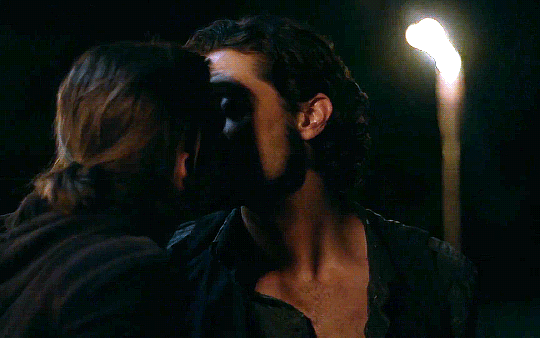
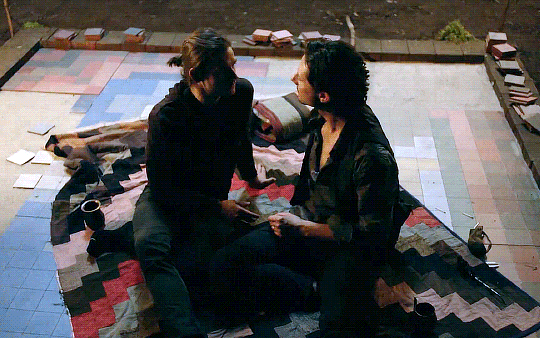
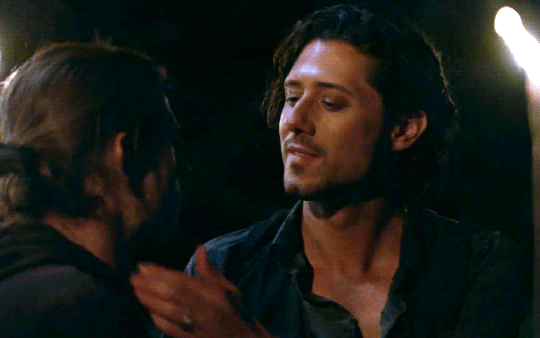
Happy anniversary, Q.
#quentin coldwater#eliot waugh#queliot#the magicians#themagiciansedit#queliotedit#quentincoldwateredit#eliotwaughedit#myedit#tvedit#this episode lives in my head rent free
765 notes
·
View notes
Text

what's the play here, beauregard?
#critical role#cr#cr3#cr2#beauregard#beauregard lionett#caleb widogast#empire kids#I AM STILL REELING FROM THIS#the rest of the episode? a blur barely remember it cause this is living rent free in my head#IT'S ALSO#extremely weird to hear matt imitating them when i'm finally finishing up c2#anyways i am excited and terrified for tonight !
6K notes
·
View notes
Text

rick baby if you're not going to hell nobody is
#rick's prayers in this episode really do be living in my head rent free#im just so in love with the characterization like if it wasn't already obvious that he has religious trauma this scene really seals the dea#getting to see rick sanchez of all people- absurd amounts of power; god complex; cynical atheist rick sanchez begging for his life in praye#it makes me feel things#and like this bit in particular. he's on his fucking knees with his hands clasped and head bowed. man's SCARED and i am emotional#yes i was raised christian how could you tell#rick and morty#rick & morty#rnm#r&m#rick sanchez#rick and morty season 2#a rickle in time#my nonsense
173 notes
·
View notes
Text
Still not over the cadence of Vox saying "FUCKYOUFUCKYOU-FUCK YOUUU" and also Alastor laughing at Adam trying to come up with a comeback (consisting of calling him red and saying fuck a lot) and responding "HA HA HA. POETRY!! :D"
#they are so funny they live in my head rent free#both of you please kiss and make up (platonic) (?) so i can feel less bad about routing for either of you at any given moment#vox#alastor#hazbin hotel#hazbin hotel spoilers#hazbin spoilers#episode 8
162 notes
·
View notes
Text

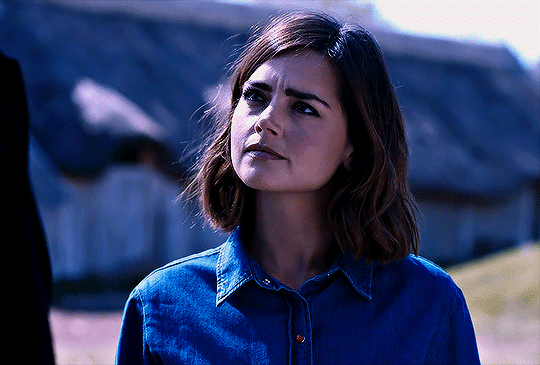
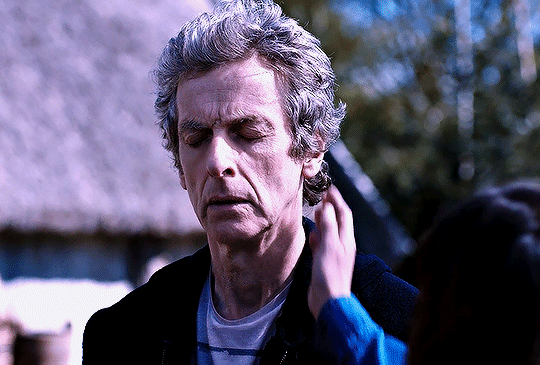
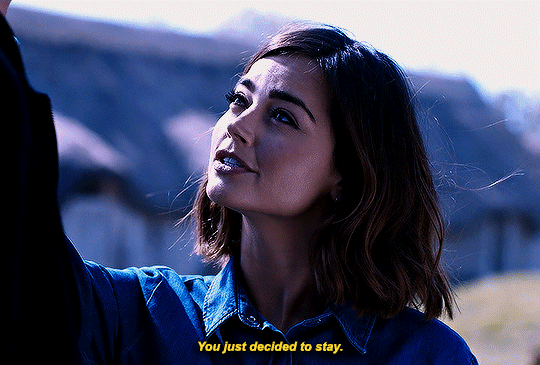
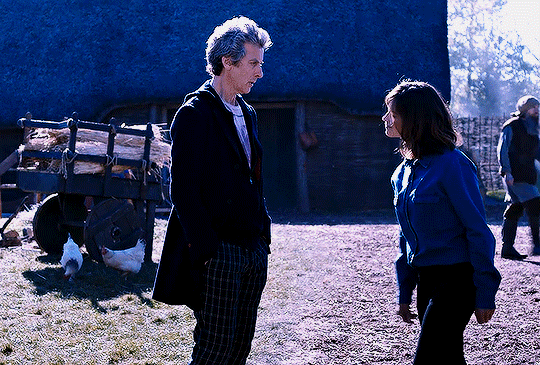

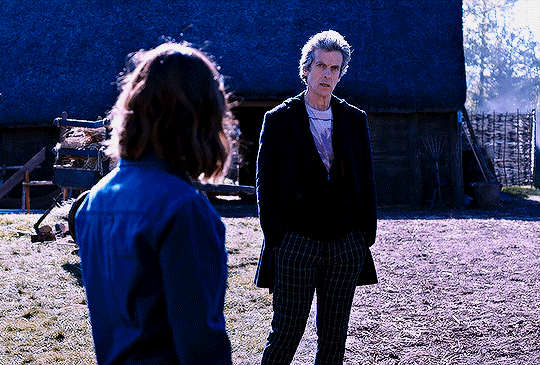
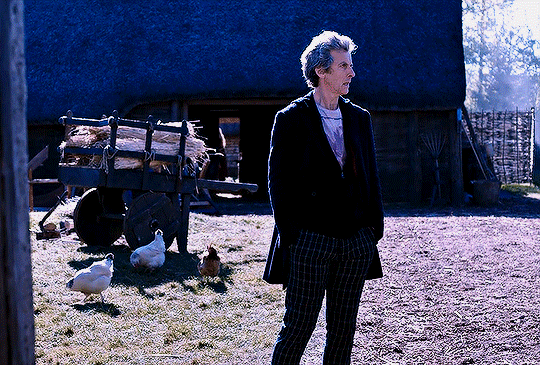
Fire in the water...
#doctor who#dwedit#dwgifs#timelordgifs#moffatedit#twelfth doctor#twelve#clara oswald#twelveclara#whouffaldi#dws9#episode: the girl who died#peter capaldi#jenna coleman#tvedit#gifwarning#this lives in my head rent free#the wordless communication#in fact i headcanon this as some sort of touch telepathy moment#and you can't stop me
435 notes
·
View notes
Text

I wish I could say that this hadn't spawned from listening to Achilles Come Down
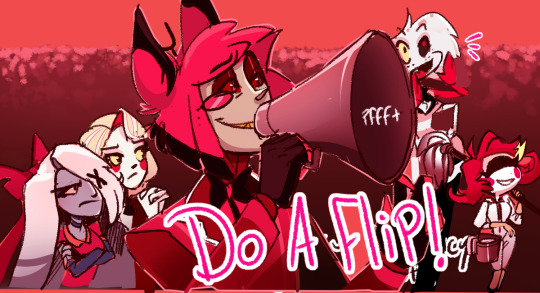
#Hazbin Hotel#Hazbin hotel fanart#Husk Hazbin hotel#Alastor Hazbin Hotel#Angel Dust Hazbin Hotel#My art#I've never seen a single episode of the office but this scene lives in my head rent free
728 notes
·
View notes
Text
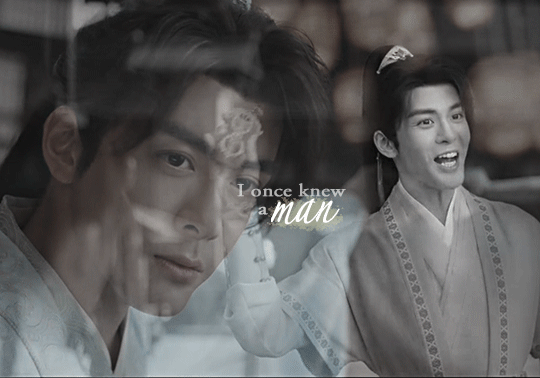



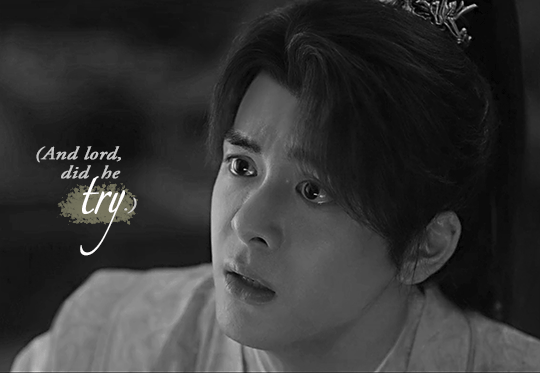
...AND ON HIS TOMBSTONE WAS WRITTEN THE SADDEST OF WORDS:
(HE TRIED.)
-> Fang Duobing || Mysterious Lotus Casebook
#fang duobing#li lianhua#fanghua#mysterious lotus casebook#lhl#mlc#*slaps hood of that “I knew you'd be angry” scene* this bad boy can generate so many devastating gifsets#my mlc gifs#btw that specific moment of fdb rubbing llh's shoulders lives rent free in my head 24/7/365#all hail Episode 30
178 notes
·
View notes
Text
In S10 of Shameless Ian initially does not want to marry Mickey. When Mickey realizes why he eventually says “when you get over this whole I’m not worthy of love bullshit why don’t you give me a call” and man did that hurt. Combine that with Lip saying he thinks they should get married if that’s what they want, but Ian needs to figure out why he doesn’t want to marry Mickey now and it hurts even more. But then the next episode Ian beats up Mickey’s date (don’t talk shit about Mick) and proposes, and we never confront this idea that Ian doesn’t think he deserves to be loved. And though I loved groomzilla Mickey, the Gallavich wedding, and married them in S11 I just really wish the writers would have given Ian time to love himself and realize he deserves love
#shameless#gallavich#ian gallagher#mickey milkovich#I think about this all the time#even if it was just an episode I would’ve been satisfied#idk it just feels like Ian was going through the wedding process for Mickey and not for both of them#not saying Ian didn’t want to get married but you could tell he wasn’t as into everything as Mickey was#though Mickey was coming at it from a “I hate my dad” stand point so there’s that#their wedding was so beautiful though#Ian finding that guy to sing living on a prayer lives in my head rent free#so yeah he wanted to get married but you get what I’m saying
73 notes
·
View notes
Text

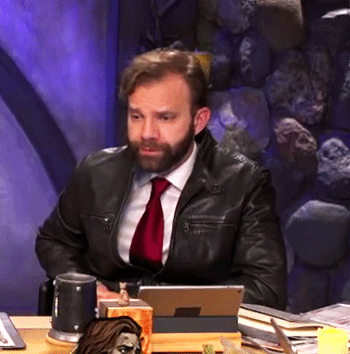

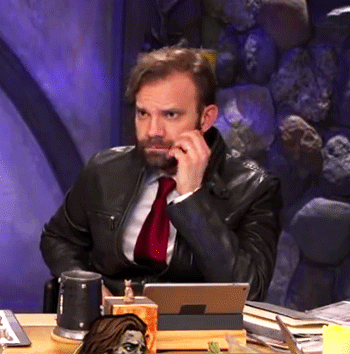
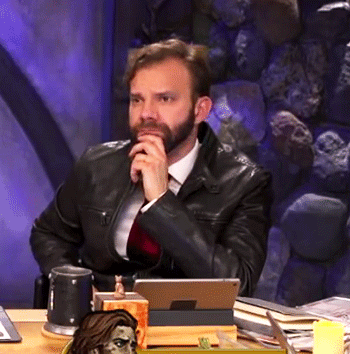

Random gifs of Liam O’Brien ( ∞ )
#liam o'brien#he just looked so good in this episode#it lives in my head rent free#critical role#campaign 2#caleb widogast#my gifs#i'm killing someone queue please
168 notes
·
View notes
Photo



Beika is a disgusting little freak (affectionate)
#splatoon#splatoon 2#splatoon 3#splatbands#c side#splatoon beika#splatoon kikura#mizole splatoon#fanart#doodles#beika lives in my head rent free and he is horrible#i keep imagining him in situations. and every time its like an episode of its always sunny--
233 notes
·
View notes
Text
Don't you just love it when you've briefly stepped away from an obsession but then you get new content to do with it and it results in you going Absolutely Insane about it again?
#in other news season four of miss scarlet and the duke premiered#AND NOW THEY'RE ALL I CAN THINK ABOUT#NO THOUGHTS ONLY THEM#perfect timing for me to have finished that story i was working on really#perfect timing in general honestly#it was. a really good episode#several scenes/lines will be living rent free in my head#just. LUALJFLSKDJFLKJSDFLJKDSFLJ AUGH#i will NOT have nothing to think about at work tomorrow which is nice#but also OH BOY THE BRAINROT IS REAL#miss scarlet and the duke
83 notes
·
View notes
Text









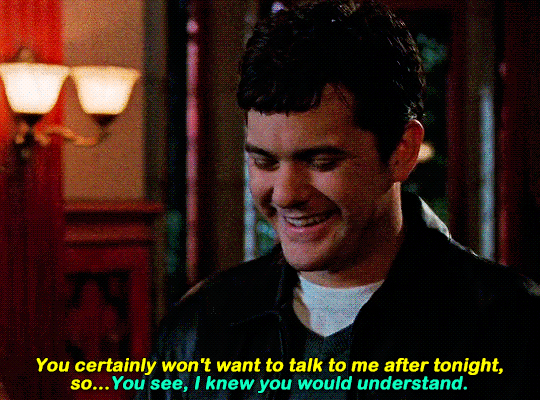


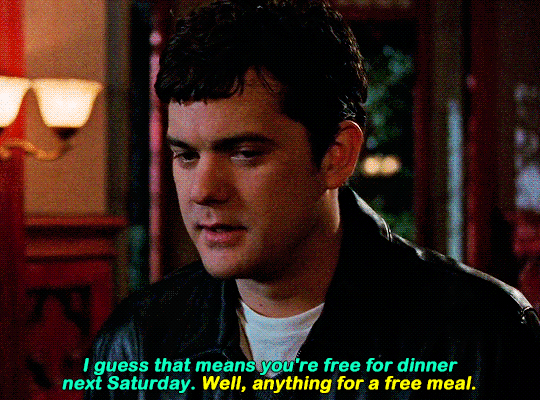
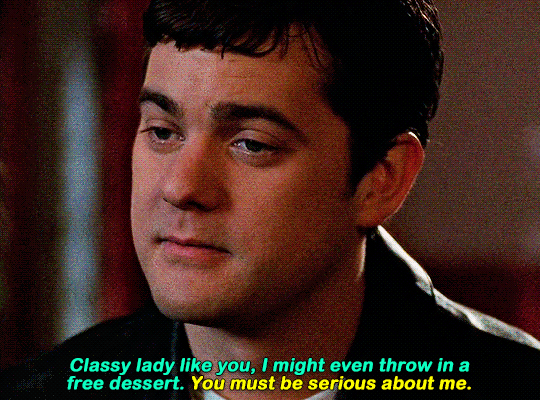
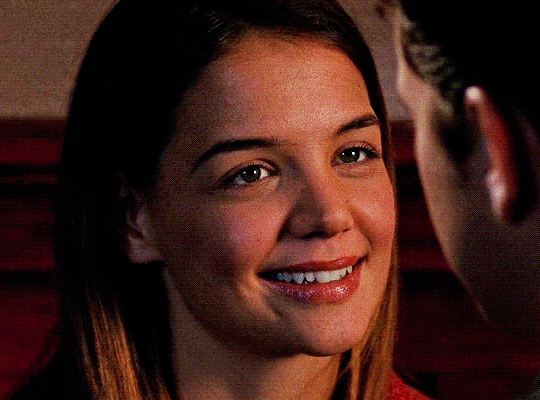


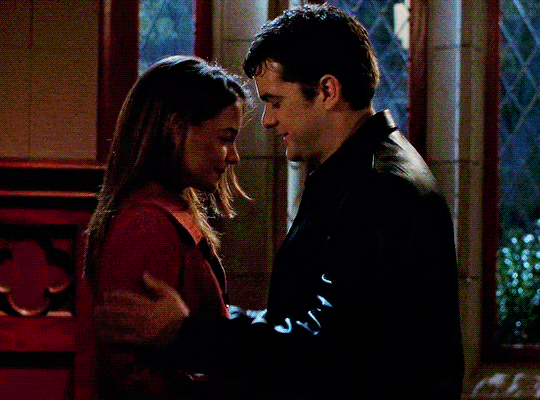

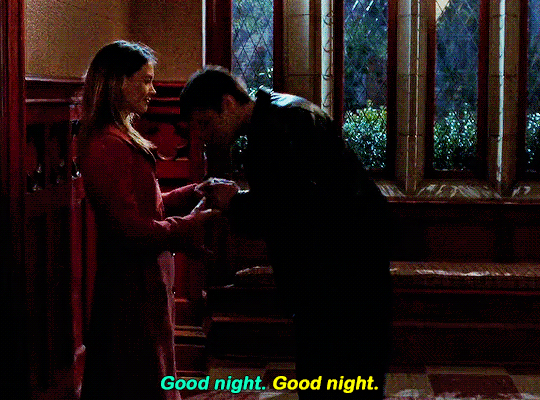
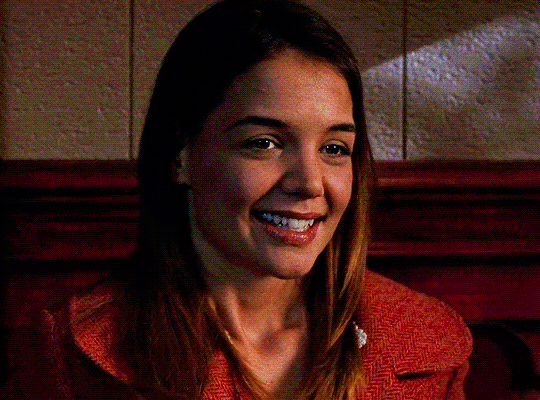
Favorite Pacey/Joey Moments Per Episode: 6x17 Sex and Violence (Part 1)
#paceyjoey moments#i love this episode so dang much#cuties#cute things#the little lean lives in my head rent free#playful cutie pies#my heart#perfection#their outfit combo is fire#pacey x joey#joey x pacey#pacey witter#joey potter#love#katie holmes#joshua jackson#gif#gifs#gifset#dawsons creek#6x17
71 notes
·
View notes
Text
Nagi's "Hidden Path"/ Loophole
*featuring Isagi, Bachira, and Rin analysis*
I've been thinking a lot about how Nagi represents a "hidden path" in Bluelock, and the ways in which it seems the main manga and episode Nagi disagree on whether he should succeed- the key issue being his relationship with Reo. He plays soccer for their collective dream in a manga where depending on another character for your motivation is treated as soccer suicide, which should doom him, but his own manga starts with the statement that his genius is shaped by Reo - framed as a good thing.
I've said in the past that maybe Nagi will succeed by Episode Nagi's standards, but fail by Blue Lock standards, and I still think that would be an interesting path to take, but rn I wanna discuss the alternative that Nagi succeeds by both standards, even if to a lesser extent in the main manga since Isagi is the MC. And we're assuming here that his relationship with Reo isn't permanently severed in a way that makes him more similar to every other Bllk character bc that would make him much less interesting and also remove the "hidden path" aspect that we're expecting here.
So for him to succeed by both standards, I think what essentially needs to happen is that Nagi represents a loophole or caveat in Blue Lock's philosophy. And to understand why that would be the case, we'd have to understand WHY playing for anyone but yourself is a bad thing in Blue Lock. And there are plenty of examples to draw from.
Isagi and "All for One"
We can start with the "One for all, all for one" team Isagi was in- the most extremely dependent soccer we see. I'll be drawing from Isagi's Light Novel for this, because it really just spells it out. First, let's look at the reasoning for that "all for one" given in response to Isagi's request to shoot more:
“Up until now, You could have won matches with your individual skills, but high school isn’t a piece of cake... We win together, and become stronger together! If you do that, then you'll have double the joy! And half the sorrow!”
The reasoning given here isn't that the resulting soccer is better at winning games - rather there is an emphasis on safety. "the world is tough", "If we stick together, there's half the sorrow". And within that emphasis, is the implication that the individual isn't enough.
We can also see complacency in this ideaology. When Ichinan loses, the coach says
“You fought well. It’s frustrating, but this is what Ichinan is capable of now. The third years are leaving after this… and some of you might quit soccer after today but you can be proud of the days you fought together as a team."
"To me, Ichinan’s soccer team…is the best team in Japan!!!”
Within this dream doping that Ego rants about later on, we can again see the acceptance on the individual not being enough - "You fought well... but this is what Ichinan is capable of now." We also see within the dream doping the injection of safety and lack of perceived agency. Because we are one unit, there is no blame, no frustration, no need for improvement. The point is the team, not to win, so be proud.
Most damning is the way we see this reflected in Isagi
There’s no need to take a risky battle. If they lose, it will be his fault and he will feel bad for the team.
He makes an exquisite pass to Tada's feet. A perfect last pass.
What's emphasized here is the risk in making an egotistical decision for the whole team in believing himself good enough to make that shot himself. What essentially happens here is a devaluing of the self - " I'm not good enough on my own, its safer to trust others, trust the system, not your instincts" And that forces Isagi to not live up to his fullest potential, to chase what he wants. Until Blue Lock that is.
Bachira and the Monster
Bachira is probably the character most directly "punished" in the narrative for playing for someone else. Though I feel like punish is the wrong word because this problem with his ego reared its head and was resolved in the same game - once he realized the problem, Bachira resolved to solve it
According to Bachira's explanation
"...Until now, I was afraid of playing soccer by myself. I guess I wanted you to come save me. But, once I tried fighting on my own, like I'd done as a kid, I realized...
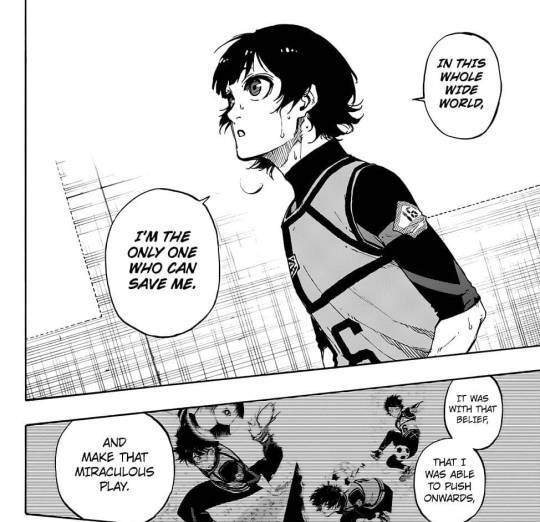
And so the problem with his habit of looking for another player when playing instead of focusing on himself was again the perceived lack of agency, and devaluing of the self. Longing for someone to play soccer with led to a dependency that negatively impacted his decisions on the field
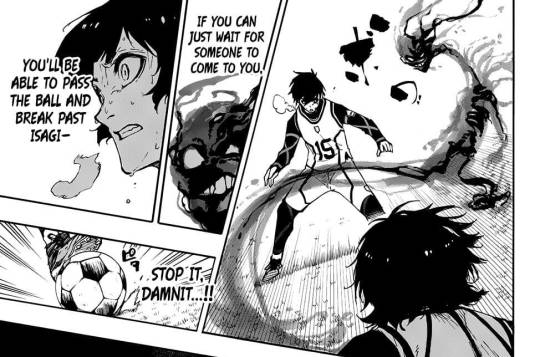
So that's why his moment of growth was breaking through all on his own to steak back Isagi and win - ignoring the idea that he should wait for someone else to help him. He needed to believe in his own agency/value to prove himself on the field and achieve his goals.
Rin and Sae
I recently took a look at Rin's Light Novel and there was a line that stood out as kinda similar to Bachira's old habit of passing to an imaginary monster before coming to Blue Lock
he understood why things were not going well. Neither their coach nor his other teammates have the slightest idea of Rin’s image of play in his head.
(If it was Nii-chan, he would have made a pass here……) he thought so many times during today's practice. He jumped out in front of the goal to a position where I said, “Here!” but his teammates were like, “Huh?” “There?”
So whether you're passing or shooting, a reliance can develop, huh...
(How do Bachirin shippers feel about this parallel? haha. And what does this say about what Rin says to Bachira "But afraid of fighting alone. It is a soccer looking for someone. That luke-warm ego won't make my heart dance". Cus it seems Rin is criticizing Bachira for doing the same thing he did. What does this mean about how Rin feels about himself? (I mean.. he did already call himself lukewarm later but was he thinking about himself in that moment?))
In the light novel, I think it becomes clear one reason why Sae is so against Rin using him as his reason for soccer - it definitely affects how Rin plays when Sae is away. And since Sae becomes aware of the competition outside Japan during his time abroad, he knows that Rin's mentality as it was wouldn't be enough and thus wanted to spare him the suffering and have him give up. And this is in combination with the idea of "I've found out, that I'm not strong enough to hold you up. If you rely on me you'll fail" At least, this is my interpretation of it - but moving on-
With Rin’s last pass, they score a shot.
If his Nii-chan had been there, he would have passed the ball to him in front of the goal and he would have scored it directly….. He stopped thinking.
No pass is coming. That is now the reality. Anyway, the team won for the first time in a long time.
We see a lack of agency and a reliance on others once again - "If only Nii-chan was here". Like with Bachira, Rin is waiting for someone to "save" him, which limits what he chooses to attempt and stifles his potential because of how it limits his perceived agency.
We can also see this limitation in how he wants to be 2nd best after Sae - not best (de-valuing). It causes Rin to seal off his ego in order to catch up to Sae, by being more similar to Sae instead of developing according to his own unique talents/ego.
In order to catch up with his Nii-chan he saw off at the airport, he has to make the team’s victory his top priority. To do so, he must hold himself back.
Hold back the you who was trying to steal the goal with everything you have using that sense of smell for the goal and assemble an attack as a team play.
Even after Sae's return he's always on Rin's mind, and this still limits his soccer. It's only after Rin declares himself lukewarm and rejects the stories others create through their relationship with him that he is able to go all out by embracing his own personal style, rather than focusing on others.
Back on Topic!
So in summary, what is wrong with depending on others? What causes Blue Lock to default to individualism? Ultimately it seems like its the resulting lack of perceived agency - the idea that you can't do things without other people present. By constraining yourself into a narrative with other people, you limit what you can do, and you limit what you think you can do by molding yourself to their vision. Thus, your potential is stifled.
How can Nagi and Reo become an exception to this reasoning? Well, maybe Nagi's decision to leave Reo during 2nd selection is part of the key.
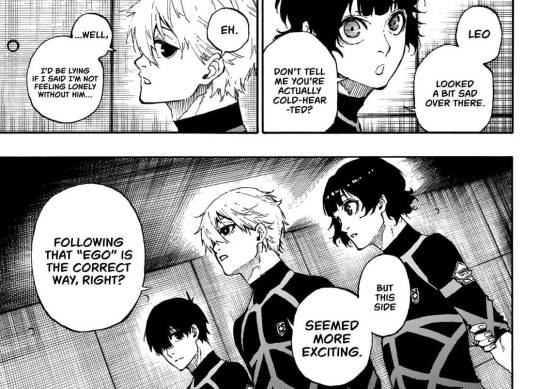
We know from Episode Nagi and Manshine that Nagi wants to improve for the sake of his and Reo's collective dream. And he (correctly) identifies following soccer that challenges/excites him as the proper way to improve.
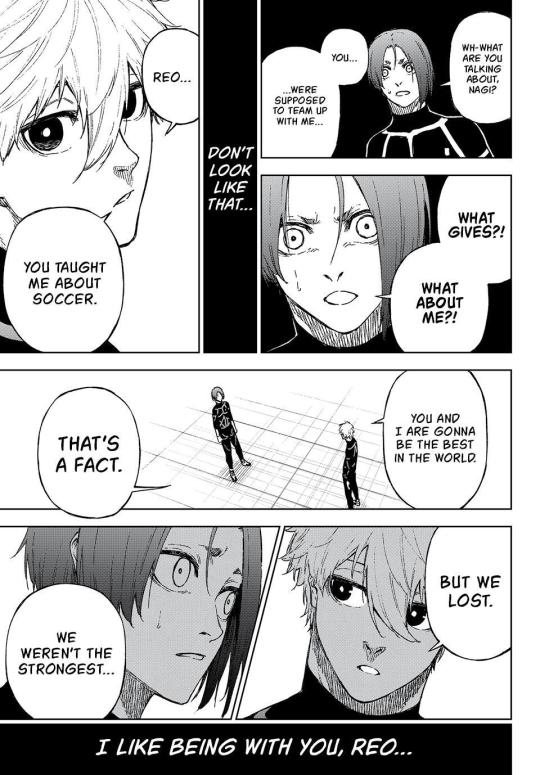
Here, Reo identifies them playing together as a must, but Nagi corrects him and saying that them being the best in the world together is a must, saying (in his head T-T) that he likes being with him, but that in order to protect their dream, Nagi needs to change.
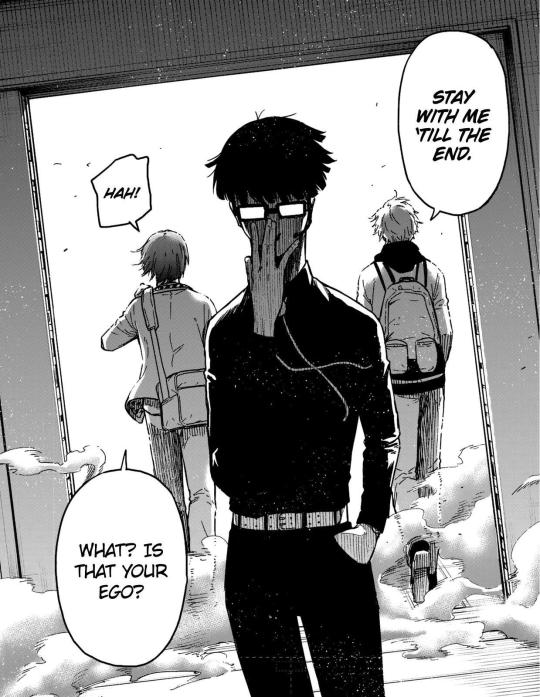

It's actually pretty much spelled out here. Nagi says he's fine with Reo playing with other people, but insists that Reo stay with him till the end. Its ok to play soccer with others, but keep me in your heart always. In other words, I don't mind not playing together, but you and our end goal is always in my heart.
This is different from Isagi, Bachira, or Rin's situation because in those cases, the team/monster/Sae were considered as key to success. However, in Nagi's case, success is key to Reo. It's completely reversed. It's that nuance of "I play soccer to play soccer with you, to win with you" vs. "I play soccer for you, I win for you". Because "playing together" is not a requirement for winning, it no longer acts as a constraint that restricts agency. Nagi's concept of being together separate from playing soccer together saves their partnership from being the same as the others and frees him to (for example) join Isagi to improve.
You can see more of this in epinagi
The Tag Game
You might say this is a bad example because Nagi relies on Reo to get him un-eliminated, but by Nagi's "I figured you'd do that, Reo..." we can guess that this was more from laziness than a belief that he needed Reo's help. Indeed, when Reo's in danger of being eliminated himself, when their dream is in any real danger, Nagi takes it upon himself to solve the issue
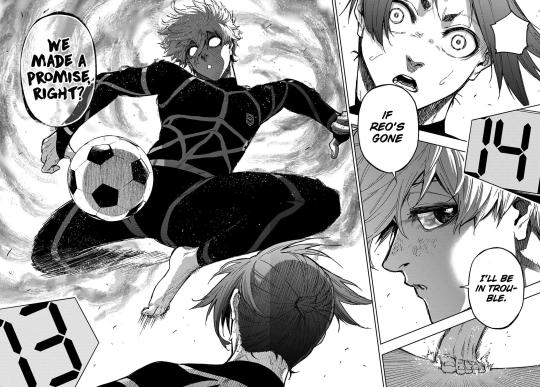
They didn't solve the problem relying on teamwork/partnership or anything. Nagi solved the problem because they're partners.
Playing Against Barou
The next time their dream is "Challenged" is when Barou says "Becoming the world's best striker means you'll be alone until you die", essentially a challenge to the viability of Nagi and Reo's dream. Nagi's response to that is to run off and instigate a 1v1 with Barou
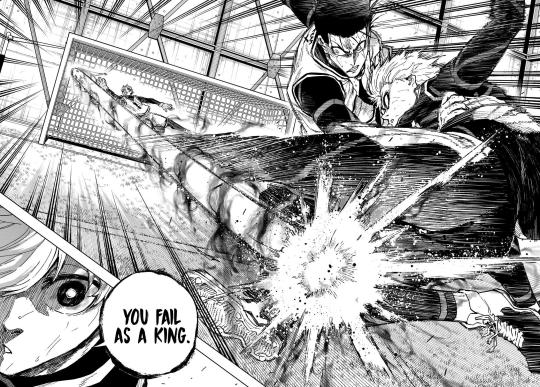
So again, rather than deny Nagi options, his partnership with Reo provided the motivation to act out on his own.
Playing against Team Z
Even when they play against team Z, we see this in action. Nagi plays a more reliant soccer, his dream/Reo is challenged when he sees Reo's face, and Nagi decides to act out on his own.
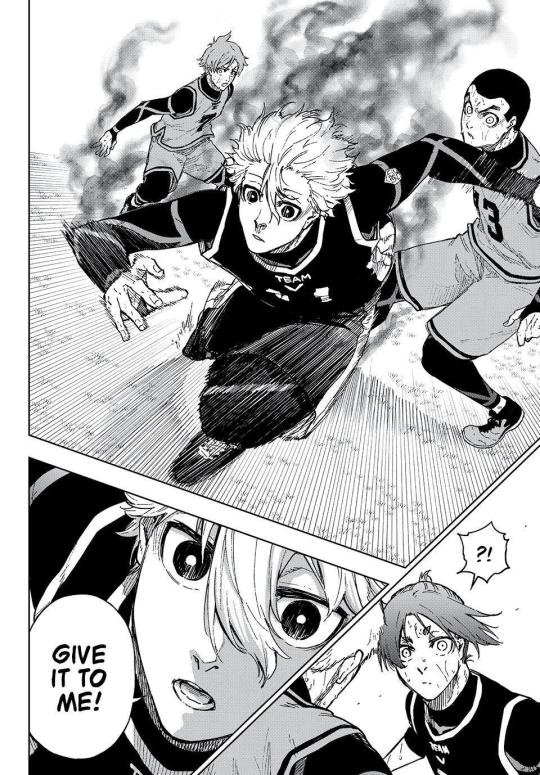
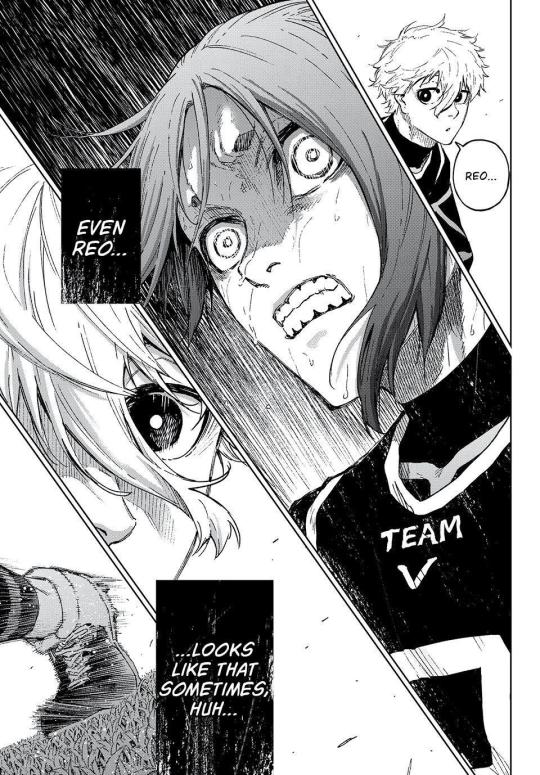
Nagi will rely on Reo for the sake of laziness, but when it comes to their dream, there's this pattern of deciding to rely less on Reo, take destiny into his own hands, and make an effort. It's really that nuance of doing something to be with someone vs. doing something for someone.
Beyond 1st/2nd Selection

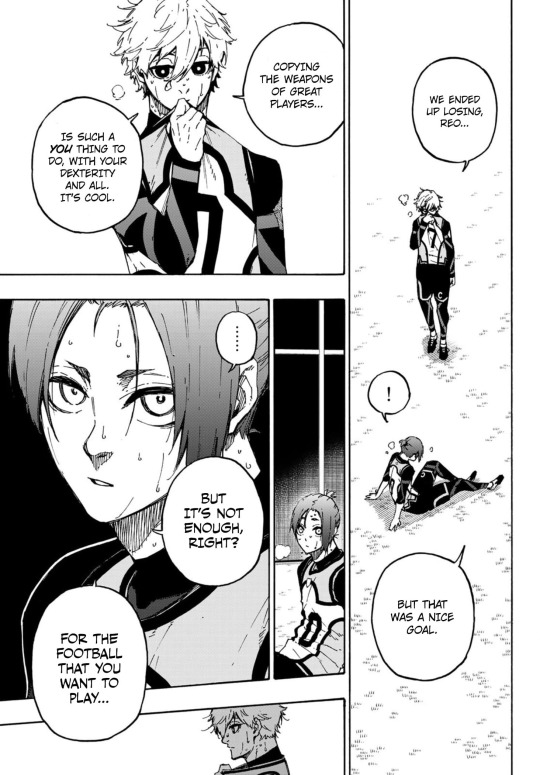
Brief mention here of Nagi's eyes shining when Reo says "But it's not enough" when Nagi praises him. I think this might be Nagi thinking its a sign that Reo in fact has not forgotten their promise and is also working to achieve it - consistent with the idea of being together without necessarily playing together (Whereas Reo is thinking the other way round - improving for the sake of playing together because that's the only way to be together)
So, where this theory hits its roadblock is the Manshine City Arc, where Nagi asks for Reo's help. But because of all the ominous foreshadowing afterwards, in addition to Ego's words that Nagi's deep ego (implied by timing of skull imagery +all the scenes I just listed to be Reo/dream-centric) is about to be tested, I think their dynamic is bound to change in some direction within the next game. So, their relationship is still in development and the theory isn't necessarily debunked.
**edited in addition** I think the key is that regardless of their behavior, the core of their partnership (ie their internal feelings) isn't dependency, but rather reciprocated faith and commitment, though especially with Nagi's communication and introspection issues, it may take some time for them to figure that out because Reo has no idea the faith that Nagi has in him. Reo actually assumes that their partnership can't exist without dependence - assumes its over when that dependence fades because Nagi will have no reason to stay with him, but this is him insecurely misinterpreting Nagi's intentions. They also can't really flourish until Nagi figures out his ego/motivation, though that's luckily foreshadowed to be addressed.
I think with how Reo misinterprets Nagi's motivations on a shallow level in 207, and how Nagi's motivation is foreshadowed to be addressed soon, we will get nagireo communication soon timeline wise (not real life lol). And hopefully with that communication, Reo's insecurity + Nagi's motivation can be addressed and they can begin to figure out a functional partnership within Blue Lock.
But really the key here is that faith and devotion don't necessitate playing with only each other in mind, while dependence/reliance does.
In terms of what will happen, I think we might finally get a confirmation of what Nagi's ego is - it certainly fits with their conversation in 207, where Reo tries to give a substitute that doesn't really fit. I'm not sure what would happen once Nagi and Reo have the clarity of understanding what Nagi's ego is though...
In Any Case!
I'm running out of fuel but just to let ya'll know I was thinking really hard about what the difference was between Nagi and Reo's dynamic in comparison to partnerships or teamwork criticized by the main manga and I did not expect the difference I came up with to be the difference between reliance and devotion. "I am not enough by myself" vs. "I will make myself enough for you". I still wonder if I'm just biased?
Plz lmk ur thoughts
link to a continuation of these thoughts - Hiori's Words, Reo's Insecurity, Nagi's Enforced Indifference
#reo mikage#nagi seishiro#isagi yoichi#bachira meguru#rin itoshi#bllk meta#blue lock meta#nagireo#reonagi#bllk#blue lock#Nagi's utter devotion lives rent free in my head#episode nagi
131 notes
·
View notes
Text
Stop saying that Reo refers to his dynamic with Nagi as just a business partner, that's not factually true
Or well, it's out of context and only partially true
I keep seeing this argument brought up in nagireo meta as a way to bring ammo to the interpretation that Reo sees their dynamic as transactional while Nagi cares for him as a person, using the Barou scene as a frame of reference, but. As someone who read the whole manga in japanese, fun fact! There's another time where their relationship is brought up with a descriptor before that scene, and it's in fact Reo who refers to Nagi as his partner first. Not a business partner, just a partner. Someone you spend time with.


To be precise, the word he uses is 相棒 ("aibou"), which, second fun fact, is the same word Bachira used to describe his relationship with Isagi (in the scene where he says "I love you, partner". Just stressing that cause I find it amusing lol). In Bachira's case, this word was officially translated as "buddy". It basically means partner/companion/comrade. As you can see, there's no exploitative subtext, unless you're willing to read that into Bachira's line as well.
This scene was in chapter one of episode Nagi, so it's Reo who sets the tone of their buddying relationship. Nagi just follows.

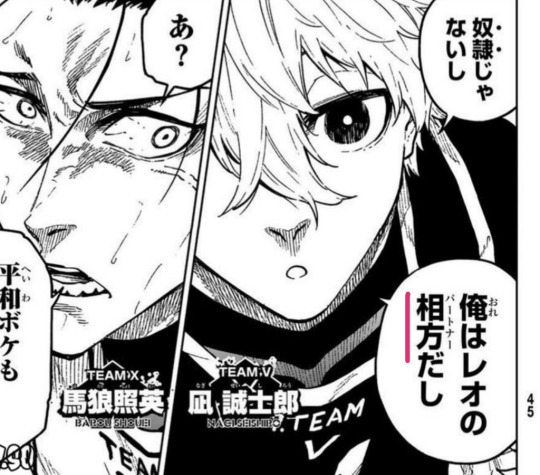
When Barou accuses him of being a mindless slave that only follows Reo's orders then, Nagi's prompt response is to call himself "Reo's partner, not a slave", using the word 相方 ("aikata") this time. As you might have noticed, it's almost the same word! Same first kanji, almost no differences in nuance as far as the meaning goes. This one too means partner, companion.
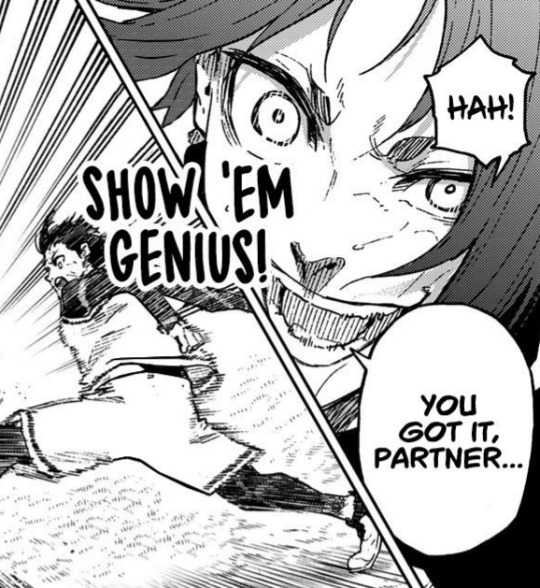

So, where does the confusion come from? Well, the thing is, Reo does call Nagi his business partner, too! A whole total of once, and it made more sense in context. The reason why this got more attention than the line in chapter one, I believe, is because Reo says it shortly after Nagi candidly called him his aikata, so it jumps out more and makes Reo sound so much colder than he is.
But again, context!
Given how Reo's the first to put a friendly label on their relationship, clearly the intent here is not to tell us he secretly only sees Nagi as an asset whose potential he's investing in. More like, this line was in response to this,
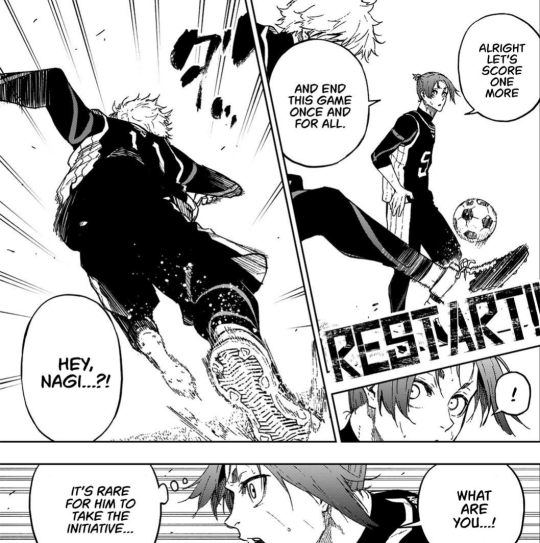
Nagi's ego rearing its head at long last, and him taking the initiative in a play for the first time. Here he calls him his business partner because Nagi's finally rising to meet him as an equal, instead of simply trudging along because of Reo's pushing. It's Nagi who requests an assist, and Reo enthusiastically provides it, and remarks upon it with this term. But, and please note, in all the three different occurrences, no matter the word in kanji, the furigana always spells out "partner", cause that's what's the focus
So please stop saying that Reo doesn't give the same weight to their friendship as Nagi does, that's just untrue. They both obviously care about each other, and their actions show it better than their words, tbh.
I guess one might still overanalyse the fact that they don't use the same exact term for partner, and wonder what the difference is, as one (me) does. This is what I found (with a japanese source for more accuracy):
「相棒」と「相方」の違いとしては、「相棒」には「ひとつの目的を達成するために共に助け合う相手」といったニュアンスがあり、「相方」には「人柄や性格を理解し合いながら、苦楽を共にする相手」といったニュアンスがあります。
Inputting this into a machine translator cause it's 1am and I don't have the brainpower to translate it myself:
The difference between "buddy" and "partner" is that "buddy" (=aibou) has the nuance of "a partner who helps each other to achieve a goal," while "partner"(=aikata) has the nuance of "a partner who understands each other's personality and character and shares hardships and joys.
Which I feel is a much better distinction that makes a lot more sense with their respective motivators/feelings. Reo sees Nagi as the person at whose side he'll be able to win the world cup, thus it makes a lot of sense for him to use aibou. Nagi gave him the confidence to think himself world class despite his father's scorn. He's his partner in crime, so to speak. While Nagi sees Reo as the first person who saw past his weirdness, understood him better than most, and as the companion he can always circle back to and tell him about the joys and hassles hardships he went through
Signed: a pedantic nagireo fan who thinks they're both the same shade of simp
#Nagireo#Nagi seishirou#Mikage reo#Episode nagi#Bllk thoughts#I have been stewing on this for weeks now#I was planning on writing a better post on it#But hey this is what you get#If you want to laugh I could still expand on this topic#Cause when I was digging in my liguistic research hole I found an article#Dissecting how japanese speakers feel about calling their romantic partner aikata#And some of the stuff it said was amusing when you read it through the lenses of nagi calling reo his romantic partner with that word lol#Anyway I'll stop rambling now thanks for reading#They live rent free in my head
100 notes
·
View notes
Text
Pinocchio loved his father. You have to remember that as I tell you what happened. It’s crucial that you remember. Because he truly loved his father. You can probably say the same thing about loving your family, your sister and brothers, and it would mean the same as myself loving my own mother and father. But the love that I had for my family paled in comparison to the love Pinocchio had for his, or the love that his father gave right back. Maybe paled isn’t the right word, but I don’t think there is any word close enough to describe the immense difference between them and everyone else. They were each other’s world, with all the stars and moon and magic that surrounded it. Which is strange if you thought about it, since Pinocchio wasn’t in the village for very long.
It was weird when I first met Pinocchio. We live in the little village of Amanti in the country of Marienne. It was a quiet classic sort of village. Not everything had magic or witches or monsters that you hear in the stories you know. Some places are just the background sets, the places that just travel through in order to get to the real plot. That was our village, quiet and unobtrusive, and we liked it like that. Boring compared to most, but it was peaceful and everyone was happy and friendly with everyone else. The children certainly knew the other children, and I prided myself with knowing everyone in town. As much as a child would know anyway. But the one person I knew very well was Pinocchio’s father.
He was an old man, with polished circle glasses and silvery gray hair. Though looking back, he probably wasn’t older at fifty at most. I had a habit of assuming anyone with remotely graying hair as old or ancient, because only old or ancient people ever had magic to them. And Pinocchio’s father was the most magical person I had ever known to that point. He worked as a wood carver, always tinkering away at his shop making clocks and toys to sell. But my favorite things were the puppets he made. Little wooden marionettes. It would take him a while to carve them, putting in extra care to their body and shape, perfecting them in ways that I would never even think about. About twice a month he would take his marionettes into the square in the little portable stage he had, and put on a show for the children. We watched as he made the marionettes move and dance across the stage, telling stories of knightly princes and clever princesses. It was the most magical thing I had ever seen, watching him breathe life into those puppets.
Once, I was lucky enough to be taken by my mother to get a new clock. I must have been six or seven at the time, and saw him working on the head of a puppet as we walked in. My mother had wanted to ask about the prices or some other adult things, but I was louder and must have asked him a hundred questions about who the new marionette was and how they were made. It must have exasperated my mother but he took it in stride. He gave the warmest smile as he gently explained to me how the parts are made, how the strings are attached, and how he was able to make them so realistically. His eyes never stopped twinkling as I kept up my questions. I think it made him happy, knowing I took an interest. But then I asked why he was careful in carving the puppets. He paused, like he knew the answer immediately but couldn’t find the right words to express it. And when he spoke there was a twinge of sadness. He said, “Because I am not just creating a body, I am creating a life. And you must always take responsibility.” I was confused by his answer, but my mother had jumped in and took control of the conversation to the clocks he had available. They did their business and me and my mother went home. I saw the same sadness in Pinocchio’s father as we did. And though I knew that my mother was very much annoyed at me inside, she looked different as we left. It was the first time I saw the look of pity on someone. When we got home she took me aside and explained to me how adults can be lonely too sometimes. Sometimes, not everyone can find their True Love like in the stories. Or how sometimes, even after finding your True Love, you may still not get a Happily Ever After. It was pretty world-shattering to learn when you’re six, but she had told me how proud she was for making him happy while in the shop. Because Lonely People can still be happy too. I had made a promise to try and keep Pinocchio’s father happy for as long as I could. Even if it wasn’t as long as I had thought.
And then life went on. The sun rose and set. The Baker baked and the Farmer farmed and I grew up. I still played with my friends and got into mischief that all children do. But I made sure every week to visit Pinocchio’s father to make sure he was happy. Sometimes I would give him gifts, small flowers or fruits I had on hand. Or sometimes I would give him good names for his newest marionettes, like Mr. Bisket or Madame Pearl-head. It would always make him laugh, and that made me feel good, knowing I was keeping my promise.
But one day when I was nine, he disappeared. No one knew where he went, but a few people saw him acting strangely the day before. He was frantic, running all over searching for something. Then the next morning, he locked his shop and just left. No note, no word to where he was going. He was just gone. For weeks rumors sparked around the village, going from him losing a valuable wood carving to him chasing after a True Love, or just lost his mind and wandered away forever. They were almost as varied and colorful as the marionettes he used in his shows. Those same marionettes that hung lifelessly in the back of his shop.
Then, a few months later, he came back. It was an astonishment really. No one had actually seen him return, much less expected it. Everyone thought he was dead. Or if he was alive would never actually be seen again. And yet, there he stood, opening his shop more joyously than before. His arrival was unannounced, but word spread fast and soon everyone came out to welcome him back. And we all saw that he didn’t come back alone. Standing next to him with twinkling eyes and a wide grin was a little boy, who he introduced as his son Pinocchio.
When I first met Pinocchio, I wasn’t sure if I liked him or not. He was…new. Too new in my opinion. His rosewood skin was polished. It didn’t have any scuffs or bruises that you would see on the other children. He had the straightest teeth I had ever seen, like white-painted fence posts. And sometimes when he moved, there was an odd stiffness to him that he wouldn’t shake off. He wasn’t inflexible exactly, but when he stretched it was like he was making sure that he was still able to move. Gently rolling his joints over and over until he was satisfied they were in order. It reminded me of oiling the hinge of a door. But more than that, I didn’t like the feeling of being replaced. Pinocchio was like the missing puzzle piece that completed his father, bringing him so much happiness and love that one only read about. It hurt seeing that. For years it was my duty to make Pinocchio’s father happy. But now Pinocchio came in and effortlessly took my spot, even if it wasn’t my place to begin with.
I didn’t know how to process that feeling, so it started to come out as mistrust and anger. It wasn’t exactly mean, but it definitely wasn’t nice. I think his father caught on how I was feeling pretty quick, at least much faster than me. Pinocchio wasn’t in the store when I went to visit again a week later. It was just his father, who smiled brightly when I came in. I had missed our weekly visits while he was away, and I liked to think that he did too. When I entered he had me sit on his chair and said that he had a very important task for me. Pinocchio was new to the village, and he was afraid that Pinocchio might get lonely. He asked if I could show Pinocchio around the village and introduce him to the other children so he could play and make friends. I wanted to scream. I felt so sick. This was how our relationship ended, not with Pinocchio replacing me for his father, but with Pinocchio replacing me for everyone else in town. It was really silly looking back on it, but those feelings were so strong and genuine that I wasn’t sure if I could contain it all. But Pinocchio’s father looked so delighted at the idea of Pinocchio making friends. So I begrudgingly went along, agreeing to take Pinocchio to our games. I was making him happy, so I’d put up with whatever weirdness Pinocchio had.
Embarrassingly, it actually didn’t take very long for us to become friends. For all of my worry and aggression when we had first met, he was just a normal kid. When I introduced him to the rest of the children, he got along with everyone so well. I wanted to be mad at him, that this was proof he was replacing me. But I wasn’t. I actually got along with him too. And I liked him a lot. We played every day after that, any chance we got. Tag, exploring, marbles, you name it. Pinocchio was one of the gang, he fit in so well it was like he was tailor made. There was a charm to him you know, where he would be so genuine that you couldn’t help but admire. When he laughed at your jokes, you knew he actually thought you were funny. If you got hurt, you could tell he was actually worried about you, not like most kids where you only worry if you would get in trouble. He really did care.
Most importantly, he was honest. He was the most truthful kid I had ever known. If you want to get an opinion on something, you go to Pinocchio. He would always tell you what he thought, but he was never mean about it, or sugarcoat it. Just stated it as fact. And he would always find something he liked about whatever you showed, even if it was actually terrible. Of course, we would still get into trouble. He wouldn’t shy away from regular child mischief. But he always owned up to it, and accepted whatever punishment he was given. The first few times this happened, we had left him behind to take all the blame. No one wanted to get caught right? But he never called out anyone else. He wouldn’t lie about it, he just wouldn’t say anything to get anyone else in trouble. It must have rubbed off on the rest of us because eventually we all stayed to take in our share of the blame. He was good like that. He was my best friend.
You need to understand, you have to understand just how honest he was. I’d never met anyone more truthful than Pinocchio. It wasn’t just a quirk or, or his personality, or even a pledge or anything superficial like that. It was a part of his core, his entire being. When he spoke the truth, there was a great comfort to it that just weighed on you to know that this was how the world worked. It was his own magic. So when I heard him tell his first lie, it killed me almost as much as it killed him. Almost.
It was late that night, all of the children in town were out on the streets. All the adults were asleep, peacefully unaware that we snuck out of our beds for a bit of mischief and fun. It was a bright full moon, giving us enough light to play and dance under its gaze. I don’t think I had as much fun before as I had that night. At least, before she walked in.
She was beautiful as she walked into the village square. Her face illuminated in moonlight with eyes twinkling like stars. Her dress was a void black, frayed and marked in intricate designs that covered her body. It was frayed, but it trailed behind her like an evening gown. Billowed might actually be the better word. She was so graceful it felt like the wind had summoned her, breezing through our simple lives without a care in the world. We all stopped our games just to watch as she walked closer. By the time she reached the square, everyone surrounded her. She was so beautiful. Like the night itself had taken form. She leaned on her staff and addressed all of us. She said she had a game for us to play, and seemingly out of the night air itself she pulled out a magnificent ball. It was as white as the purest snow, covered in the softest silk. It was wondrous and magnificent and promised to be the most fun for anyone to play with it. I wanted that ball so badly. We all cheered in excitement to play with that magnificent white ball.
Soothing our excitement, she explained the rules. She will ask us a question and if we answer truthfully, we will get a turn. We all nodded, agreed to the rules. Eager to please and to take our turn. She started with my neighbor from down the street. “What is the name of your father?” she asked sweetly. Smiling, my neighbor answered, “My daddy’s name is Nico.”
A scream rang out. It was thick and ragged, coming from deep in the village. We all turned towards the sound, confusion on our faces. But the woman called to us, focusing our attention on her and her game once more. She walked up to a little girl next. “What of your father’s name?” she asked. “Robert,” the poor girl answered. Another anguished scream pierced the night. The woman moved down the row, one by one, asking each child the name of their fathers. And with every answer a painful scream. All of us cried. The children at the beginning of the line cried for the deaths of their fathers. While those at the end cried for what was to come. I myself wept so achingly because that ball still called out to me and I knew in my heart I would kill my father to play with it. Even as the night air choked on death. Even as I saw the ball writhe and squirm in the woman’s hand. Hatred burned inside me as I stared at that horribly beautiful woman who still wore that gentle smile. But I could not turn away. The ball had already claimed me, as it waited to eat my father’s name.
Pinocchio stood next to me. His presence gave me some comfort, as little as it was, but he confused me as well because he did not cry. He looked pensive. His brows furrowed in deep thought. I wasn’t the only one who noticed as the woman approached. She turned her head slightly as she looked at us. Pinocchio looked uneasy while I sobbed. It felt like I was crying for the both of us, and that was important somehow. If I was the one crying, then Pinocchio wouldn’t be distracted with his own tears. That my tears allowed Pinocchio to think, give him time to take action and do…something. Honestly I was so racked with despair that I had to cling onto something otherwise I would go mad. So I cried for Pinocchio as much as me, and the woman saw. I think that’s why she asked him a different question, what his own name was. And Pinocchio answered truthfully. “My name is Pinocchio”. She smiled, then asked him, “And what is your father’s name?”
Pinocchio looked uncomfortable, hesitated in his unease, then answered.
“Daniel”.
I couldn’t breathe. I was so terrified but I think this was the moment that broke me. I couldn’t breathe as I watched Pinocchio lie. Lie in the face of evil or god or whatever being it was that demanded the truth. He lied. I didn’t know how it was possible. I didn’t think that he was even able to lie. He never lies. But he loved his father. He loved his father more than himself and the moon and stars. His words lied but his love was genuine, and I wept knowing I could never have a love as profound as that.
In my grief I had failed to notice the lack of a scream. But the woman didn’t. She frowned, then snarled. And with a wave of her staff Pinocchio fell to the ground dead. It happened so fast I didn’t even realize. Just watched his body go limp and loose and sprawled out below. I think it was my mind trying to process what happened, but it reminded me of one of his father’s puppets. As if the puppeteer that was holding him up suddenly cut the strings from his body. When I realized he was dead, I just had another reason to cry. And while I was next to be asked a question and kill my father, my tears were shed solely for my friend and his bravery.
Then a miracle happened. Before the woman had a chance to turn away, Pinocchio’s body started to glow. It was a rich and vibrant blue, light and airy like the day sky. It rivaled the sun as it cut through the night, and blazed out of my friend.
I’ve learned much about magic since then. Not just tricks and wizardry that most people have, but raw magical powers only possessed by the most powerful of arcane creatures. Fairies are one of them. Fairy magic is ancient. You cannot escape a fairy boon or curse. It will stay on you for all eternity and then some. But fairies know this also, and that is why when they lay their spells they are just as cunning as they are powerful. To avoid the brunt of the spell, they would use their own magic to shift the spell in a new direction. Weaving the magic to a new purpose. Changing a spell of death to eternal sleep for example. A fairy cannot completely alter the spell, and they definitely cannot remove another fairy's magic. If they do, then they will face a magical backlash of unimaginable power.
When that woman used her magic to kill Pinocchio, she had disrupted the fairy spell that was placed on him. I don’t know how or when he had met a fairy, or what he did to receive their boon, but he had one. And it was powerful. And when that boon was destroyed, all that was left was unrestrained raw magic. The brilliant blue light came forth from Pinocchio’s body pulsing fanatically until everything was covered in its light. I couldn’t look away as magic enveloped everyone. Distantly I heard the scream of that wretched woman. I was scared, I was sobbing, and it felt like I would see nothing else but that blue light.
Then suddenly, it was gone. The magic had vanished, leaving us still standing in the square. The woman and her staff and her horrible ball, they were gone. The night was gone too, an early morning sun gently rising in the sky. If I had not wept so harshly before I would have cried in relief seeing the sun again. The adults had come out of our homes and rushed towards us, embracing us in their own relief for what had transpired. I could have willingly drowned in my mother’s hug, fiercely clinging onto her as she gripped me. But the grief still stayed. Because Pinocchio’s body was gone too.
The village has changed since then. It isn’t as overt as you might expect. The people are friendly enough with one another, we still have a sense of a small town comradely. We don’t go out at night. But considering the monsters that would normally lurk in the darkness, that’s just good practice. And we don’t shy away from the odd traveler that enters. They are still welcomed for their business. But really, only for their business. We don’t allow them to stay for long. But sometimes they stay long enough to realize that we never say our names. Not to each other and certainly not to outsiders. Names are a very powerful thing you know, but they aren’t needed in daily life. The Baker is The Baker after all, so we get by just fine. The only names that we say are the names of the dead. And Pinocchio’s.
We’ve never recovered his body. It had disappeared along with the other wicked things from that terrible night. As well as his father. When some villagers tried to give him the news of his son’s death, they weren’t able to find him. His woodcarver’s shop is still closed, with marionettes hanging in dust and darkness. The villagers say Pinocchio’s name because he had died. And I know he did. But I also know that magic is a wondrous thing, and miracles can be repeated. Pinocchio’s father didn’t die that night. Pinocchio did in his stead. So I will wait for Pinocchio’s father to return once again, with Pinocchio standing at his side. Someone should greet them back properly. After all, his name isn’t Daniel.
#this story was living rent free in my head since that first episode#god I'm finally done with it#welcome to my magnus archives spin on pinocchio#pinocchio also lives rent free in my head#I had tried my best here#for 2 weeks#god why was this hard to write#feel angst with me#pinocchio#neverafter#neverafter pinocchio#tma#tma style#the magnus archives#tma inspired#d20 neverafter#neverafter d20#dimension 20#lou wilson#brennan lee mulligan#my response
464 notes
·
View notes
Photo

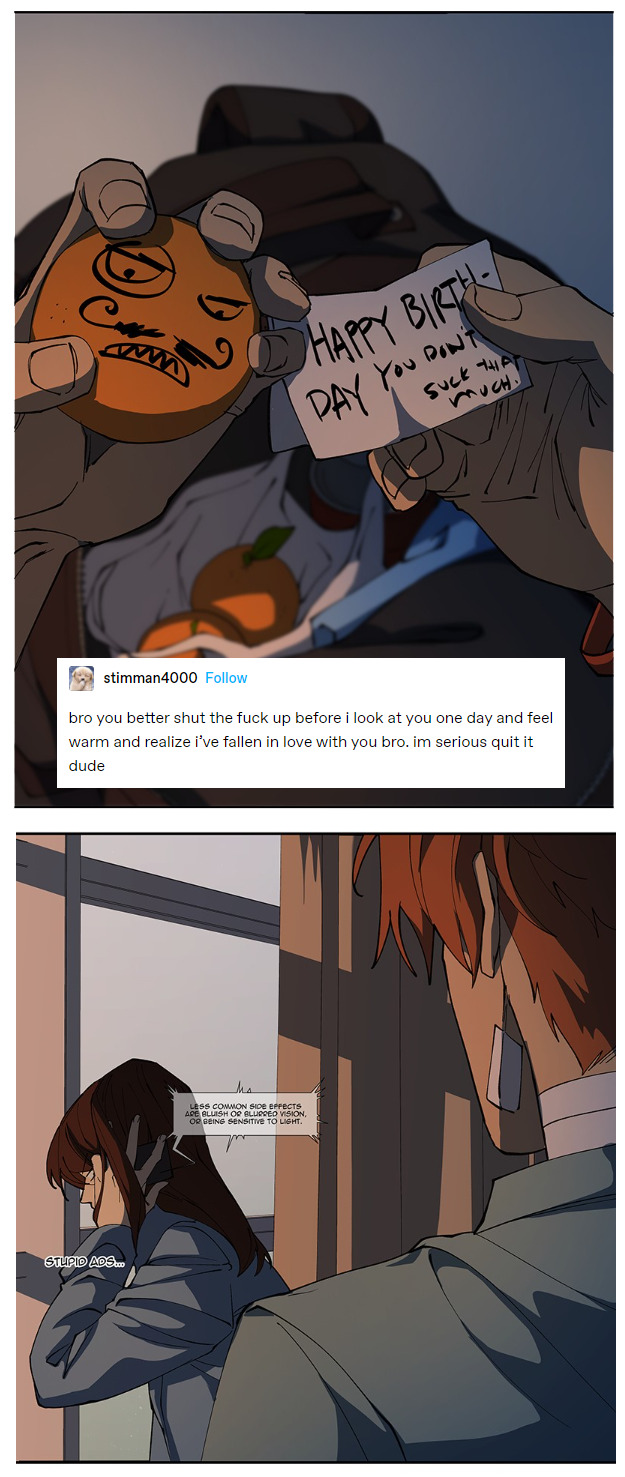
I HAVE WAITED AN ENTIRE MONTH TO MAKE THESE! I HAVE BEEN SITTING ON THIS STUPID IDEA FOR FOUR WEEKS. PLEASE. ENJOY THESE LMAO
i’m alkfjFLJAFJAFKJLKAJFLKJFKjfkjafkjakjfjkaf you know?
#I Love Yoo#ILY Brainrot#Stalkyoo#Aegi#I DIDN'T KNOW WHICH ONE I LIKE BEST#SO. HAVE BOTH LMAOOOOOOOOOOOOOOOOOOOOOOOO#literally this post concept has lived rent-free in my head for four weeks LMFAO ALFJKALFJALFJALFJJAKJFJAF plssssssssss#I HAVE SO MANY FEEEEEEEEEELIIIIIIIIINGGGGGGSSSSSSSSSSS ABOUT THEM ABOUT THIS EPISODE ABOUT THE WAY THEIR RELATIONSHIP HAS DEVELOPED#ABOUT WHAT THEY'VE COME TO MEAN TO EACH OTHER#HOW IN JUST THREE-ISH MONTHS OR SO THEY BECAME SO IMPORTANT TO EACH OTHER#they could have ben ships passing in the night a memory of someone to forget later#but instead they became friends instead they came to MATTER to each other TO MEAN something to each other and GOD#ISN'T THAT JUST THE GOOD STUFF?#when people just. HAPPEN. YELLS#I LOVE THEM#that's it that's the post#they mean so much to me lmao
271 notes
·
View notes